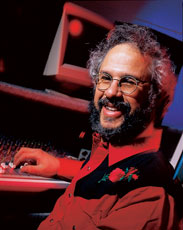|
|
The X Files |
December 1998 |
|
Scully and Mulder go undercover at the AES Convention.
One of the most newsworthy events at the 105th Audio Engineering Society Convention in San Francisco took place behind closed doors. Amidst the technical papers, product demos, and general hustle, Agents Scully and Mulder (bet you didn't know they were on the EM staff) discovered that Cakewalk Music Software held a private developer's meeting at which the respected software company unveiled a new technologv proposal called "AudioX." Plainly, the tiresome twosome reasoned, this plan was part of a dark conspiracy for sonic communication between humans and aliens.
Despite Cakewalk's desire to keep this proposal hidden from the public ear until it was further developed, it quickly became the talk of the show's computer-products community. The secret is out! Having debriefed our two secret agents, we figured out that AudioX is, in fact, a proposal for communication between computer audio hardware and software. (Maybe that isn't so far from Mulder's "alien conspiracy" theory after all.) AudioX is intended to establish a standard solution for enabling audio software to support the new, more advanced capabilities of the latest audio hardware. It is a supplement to, not a replacement for, audio-streaming drivers that allow software to address computer audio interfaces (e.g., Windows 95 and NT drivers, DirectSound HAL, and ASlO).
Many audio interfaces provide advanced capabilities that current audio drivers can't support. For instance, audio-streaming drivers don't support internal mixer functions such as patching mixer channels to and from I/O ports; providing precise, low-latency control over volume, pan, solo, and mute; and supporting busing for pre- and postfader sends and returns. Streaming drivers also don't provide direct support for SMPTE sync, varispeed pitch control, peak metering, and onboard sound-card DSP for effects. AudioX addresses all of these issues.
Furthermore, according to our agents, Cakewalk is offering AudioX as a cross-platform, open standard; nobody has to license the technology, and the code is available to all developers. It would be compatible with existing audio-streaming drivers and would coexist with such new technology as the Windows Driver Model.
I can't comment on the under-the-hood aspects of AudioX, partly because I possess only a few details’ÄîMulder insists that aliens wiped most of the technical info from his memory’Äîand more importantly because I am not a design engineer. But the Cakewalk engineers (who are not aliens, despite what their friends may think at times) have a fine track record, and the developers Scully and Mulder debriefed were enthusiastic about the possibilities of establishing AudioX as a new standard.
I am a big fan of establishing standard interfaces that make integrating a system as easy and trouble-free as possible. A well-integrated studio is easier and more fun to use; maximizes time spent actually making music instead of troubleshooting; and encourages experimentation with various combinations of products. AudioX appears to be a fine effort in this direction. I urge the developers to examine this proposal closely and, if it makes as much sense technically as it does in principle, to find enough resources to make it fly. No saucers required, of course. |
